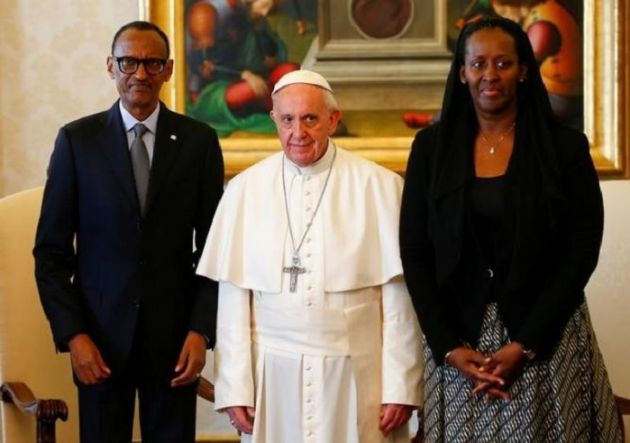Pope Francis talks candidly about Catholic Church on trip to 3 African countries

In Mozambique, Madagascar and Mauritius, Pope Francis this past week celebrated masses with almost 1.5 million people in total during his trip to Africa where Pentecostals are surpassing Catholics in some countries.
Most of the people at those masses were poor, and in Madagascar, many people spent the night sleeping outside in the field where Mass was celebrated in order to be present, America, the Jesuit Review wrote in an editorial.
America noted that throughout this papal visit to Africa, the universal church was invited to see what a "poor church for the poor" looks like.
It cited as a strong example, Akamasoa, a cooperative project outside the capital of Madagascar through which the local people have built more than 3,000 brick homes, along with schools and clinics, in what was formerly a garbage dump.
In his remarks there, Francis described Akamasoa as "an expression of God's presence in the midst of his people who are poor."
The magazine noted that, however, this aspect of the trip was overshadowed by what happened on the plane.
On the flight to Africa, Pope Francis described himself as "honored" by some attacks on him during an informal conversation with a French journalist who had written a book about American opposition to Francis.
In the press conference on the return flight to Rome, asked about whether these attacks could lead to schism, Francis said,
"There is always schismatic action in the church" but that it comes from "an elitist state, from ideology detached from doctrine" and from detachment "from the people of God, from the faith of the people."
Joseph Hellweg, associate professor of religion at Florida State University writing for Quartz Africa said that the Pope spoke on peace and ecological sustainability issues that the three countries he visited are facing.
Mozambique recently signed a peace accord with persisting rebels, and the country is still recovering from the cyclone earlier this year that killed over 1,000 people.
SEVERE DEFORESTATION
Madagascar faces severe deforestation, and Mauritius too is at risk from climate change.
Africa has the world's third largest Catholic population, after the Americas and Europe. Almost one out of every five Africans – 19.2 percent is Catholic.
The Pew Research Center expects the number of African Christians south of the Sahara, including Catholics, to double by 2050.
From Hellweg's perspective as an African religions' scholar, however, Francis' visit needs to be understood in terms of the church's longer history in Africa and the current challenges Catholicism faces in the continent.
Although Catholicism in Africa expanded dramatically under European colonialism in the 19th and 20th centuries, he noted that the church's roots in Africa go back to its earliest days.
Christianity began in Africa among first-century Jewish communities in Alexandria, Egypt. Many early, influential church figures were North African.
After the Islamic conquest of North Africa -- from 634 AD to 711 AD, however, Islam grew faster than Christianity, making it the region's dominant religion.
Muslim traders then took Islam across the Sahara desert to West Africa and over the Indian Ocean to eastern Africa.
Later, the Catholic missionaries on the western, central, southern and eastern coasts of Africa spread Christianity across the continent.
Then in the 15th and 16th centuries, the Portuguese came to Africa by ship and began winning converts in the Central African kingdom of Kongo.
On the other side of the continent, in today's Mozambique, missionaries established Catholic communities that would eventually become the contemporary Mozambican Church.
French missionaries arrived in Madagascar in 1640. With the help of early converts, they produced a Catholic catechism, or teaching manual, in Malagash, the island's indigenous language.
Hellweg explain that colonization and evangelization occurred in sync as the Portuguese colonized Mozambique; the French, Madagascar; and Britain, after initial French occupation, Mauritius.
Catholic missionaries also decried colonialism. He cited the expelling in 1971, by Portuguese authorities in Mozambique of a Catholic order for criticizing the colonial regime for preventing missionaries from properly serving Mozambicans.
Elsewhere in Africa in the period of transition to independence, from the late 1950s to 1980, many priests supported emerging ethnic and nationalist movements.
But notes Hellweg the lasting outcomes of these Catholic-backed independence movements have been mixed.
In Mozambique, Catholics make up 30.3 percent of the population, the country's biggest religious group, exceeding indigenous religious practitioners and Muslims.
In Mauritius, at 27.2 percent, Catholics take second place to Hindus but outnumber Muslims. And in Madagascar, they come in third at 21.7 percent
But the church faces new challenges, for examples in 1970, Pentecostals accounted for less than 5 percent of all Africans.
They now stand at 12 percent and in Mozambique alone, Pentecostals are the second largest Christian community.